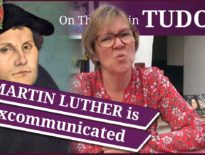On this day in Tudor history, 4th January 1575, in the reign of Queen Elizabeth I, courtier, diplomat and former rebel, Sir William Pickering, died at his home, Pickering House, in London.
He died a wealthy man and died a natural death, a miraculous feat seeing as he was a friend of the Earl of Surrey and the Duke or Northumberland, both of whom ended up on the scaffold, AND he was one of the men involved in planning Wyatt's Rebellion in 1554. Wyatt lost his head, but Pickering kept his.
How? What happened? Find out more about Sir William Pickering in today's talk.
Here is my video on William Roper from last year:
Also on this day in history:
- 1493 – Christopher Columbus left the New World on return from his first voyage.
- 1519 – Martin Luther met with Karl von Miltitz, the Papal Nuncio, at Altenburg in Saxony.
- 1568 – Burial of Roger Ascham, author, scholar and royal tutor, in St Stephen's Chapel at St Sepulchre-without-Newgate, London.
Transcript:
On this day in Tudor history, 4th January 1575, in the reign of Queen Elizabeth I, courtier and diplomat Sir William Pickering died in London.
He was buried in the chancel of St Helen’s Church, Bishopsgate, in London, along with his father, who was moved there to be with him. Pickering had ordered a tomb to be made, instructing that it was to be “garnished and decked with the armes coates of me and my auncestors”.
Pickering is an interesting man in that he was involved in a failed rebellion, but unlike some of his fellow rebels, he kept his head.
Let me share with you a few facts about this Tudor courtier, diplomat and rebel.
• Pickering was born in around 1516/17 and was the son of Sir William Pickering, knight marshal to King Henry VIII.
• He was educated at St John’s College, Cambridge, by Sir John Cheke.
• In 1538, Pickering was recorded as being at the royal court and serving the king as one of his “daily waiters”.
• Henry Howard, Earl of Surrey, acted as his patron and the two men, along with Sir Thomas Wyatt the Younger, had to appear before the royal council in April 1543 charged with eating meat during Lent and committing vandalism, by breaking house and church windows at Candlemas. Pickering confessed and was committed to the Tower of London for just over a month.
• Pickering served his king in Calais during Henry VIII’s French Wars in the 1540s.
• John Dudley, Viscount Lisle and the future Earl of Warwick and Duke of Northumberland, served as Pickering’s patron following the execution of the Earl of Surrey in 1547. Dudley’s patronage helped Pickering rise during Edward VI’s reign.
• Following Edward VI’s accession, Pickering was made a Knight of the Carpet. I hadn’t come across this knighthood before, so I looked it up and according to Merriam Webster, it is “: a knight who is knighted in formal ceremony (as kneeling in a royal audience chamber) as distinguished from one knighted informally on the field of battle;” or, “a recipient of knighthood for service or distinction other than military”.
• He undertook diplomatic missions to France in Edward VI’s reign, where, according to his biographer, Susan Doran, he earned the respect of King Henry II. Pickering didn’t enjoy his time there, though.
• In Edward VI’s reign, the imperial ambassador wrote of Pickering being a creature of Warwick’s, unlettered, a novice diplomat, and a zealous Protestant.
• He escaped involvement in the events of 1553, Lady Jane Grey being proclaimed queen and then being removed, because she was still serving in France.
• After the accession of the Catholic queen, Mary I, Pickering was one of a number of men, including his friend, Sir Thomas Wyatt the Younger, who became worried about Mary’s plans to marry Philip II of Spain, and the religious changes her reign was bringing. They decided that a military coup might be the only way to prevent her marriage and so planned a series of uprisings. The aim of Wyatt’s Rebellion, as it became known, was to depose Mary I and replace her with her half-sister Elizabeth, who would then marry Edward Courtenay, Earl of Devon.
The rebellion failed and although Wyatt was apprehended and executed, Pickering, along with Sir Peter Carew, were able to flee to Normandy, where it was said that they were planning to intercept Philip of Spain on his way to England. In April 1554, Pickering was indicted, although he was safely in Paris.
In France, Pickering changed sides and started giving information on the surviving rebels to Dr Nicholas Wotton. He was now in danger from assassination from those he had betrayed, so he kept on the road, travelling from Paris to Italy and Germany.
• Pickering was pardoned on 4th December 1554 thanks to his decision to betray the rebels and thanks also to the intercession of Wotton, Sir John Mason and Sir William Petre. He returned to England in 1555.
• In 1558, he was away from England again in 1558 when he was sent to recruit soldiers in Germany to defend Calais. Of course, Calais ended up being lost to the French.
• Shortly after Elizabeth I’s accession, it was rumoured that Pickering was a suitor for the hand of the queen, and bets in London were said to be at 25 to 100 that he would be Elizabeth’s king. However, he made it clear that he thought the queen would never marry. Pickering also never married.
• In 1569, during the Northern Rebellion, he was appointed as one of the queen’s lieutenants and in 1570, he was on the commission that tried Catholic martyr, John Felton.
• He died on this day in 1575 at his home, Pickering House, in London. He was about 58 or 59 years of age.
He left an illegitimate daughter, Hester.
In his will, he left instructions for a jewel worth 200 marks to be given to the queen by his executors. He also left money to the poor in his parish, money to St Bartholomew’s Hospital, and bequests to his daughter and friends. To William Cecil, Lord Burghley, he left his “papers of Antiquities”, along with globes, compasses, and a horse. He also instructed that his library was to be passed on to his daughter’s husband. His bequests show that Pickering died a wealthy man.
So, a rebel who survived not only being indicted as a traitor but also the vengeance of those he betrayed. A rebel who died a natural death on 4th January 1575, quite an achievement!



Leave a Reply